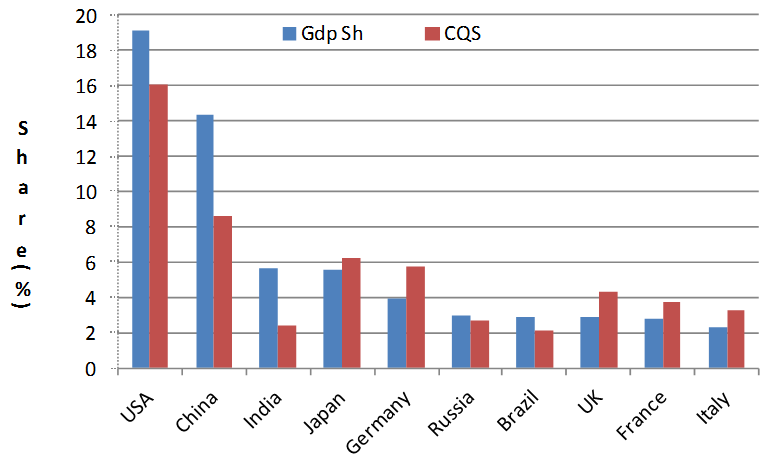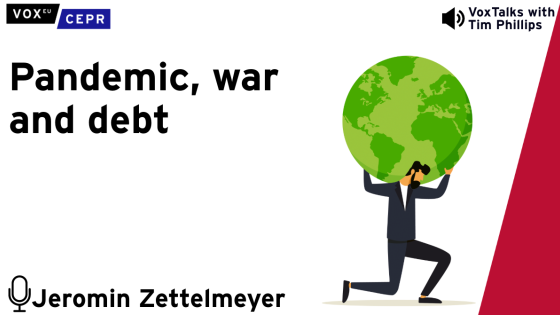The Eurozone crisis has overwhelmed all other debates about the reform and development of global governance institutions dealing with the world economy . It is therefore necessary to remind ourselves why we need a reform of the IMF quota formula. The quota formula determines the both the quota contribution and the vote share of the members of the IMF (except for the basic vote which is assigned equally to all members and therefore favors the smaller members). Not are only are all policy issues decided by a majority vote of the board, but it subtly influences the thinking and behavior of the staff. Thus a rational and reasonable quota formula reform is fundamental to the credibility and legitimacy of the IMF in a rapidly changing world economy. Unless the power balance in the IMF changes to reflect the changes in the balance of economic power in the world economy, the IMF will inevitably lose credibility as an international institution. Maybe my eyesight and hearing are not as strong as in my youth, but in the past year I have neither seen nor heard anything (in the IMF or G20 setting) that would indicate that there is any recognition by the European powers of the need for formula reform (and vote shares) to maintain credibility.
Figure 1 illustrates for the ten largest countries, the discrepancy between their share of aggregate world production in 2011 (GDP sh) and their calculated quota share (CQS). All the European powers have a calculated quota (as per the formula) that is higher than their share in world GDP, while the USA and the BRIC have a calculated quota share that is lower than their share in world GDP.
Table 1 on the contribution of major economies to World growth during the past three decades encapsulates succinctly the point about global change and credibility. In the decade of the 1980s, the US and Eurozone + UK contributed over one-fifth each with Japan contributing about one tenth. In the decade of the 2000s the contribution of each of these had declined sharply with the USA contributing less than the 10% contribution of India, and all three together contributing about half that of China. The contribution of the Eurozone + UK has declined progressively from 20.6% in the 1980s to 17.3% in the 1990s to 6.4% in the 2000s. This reflects a fundamental transformation of the world economy and an emerging shift in economic power. Unless this shift in economic power is reflected in the IMF an institution for monitoring/managing the global economy, it is not difficult to imagine it going the way of other UN institutions that have completely lost global credibility and are increasingly being bypassed.
Figure 1. Shares of world GDP and calculated IMF quota
Table 1. Structural change in the world economy
| |
Contribution to world growth |
| |
1981-1991 |
1991-2001 |
2001-2011 |
1981-2011 |
| United States |
21.2% |
26.3% |
9.6% |
17.0% |
| Euro Area + UK |
20.6% |
17.3% |
6.4% |
12.6% |
| Japan |
11.4% |
2.4% |
1.0% |
3.7% |
| China |
8.7% |
17.9% |
29.6% |
21.6% |
| India |
4.4% |
6.5% |
10.1% |
7.8% |
| Rest |
33.8% |
29.7% |
43.4% |
37.3% |
There is one other very important fact that is often obscured, sometimes deliberately. The contribution of the "Rest of the World" has increased by 10 percentage points from 33.8% in the 1980s to 43.4% in the 2000s. A formula that fully reflects the changes in the global economic power will add to the vote share of the smaller countries, not reduce it.
The US share of the world economy has declined from 23% in 1980 to 19% in 2010. Yet they have wisely chosen to hold a little over 15% of the quota shares and continue to remain below their share of the World economy. The Euro area + UK's share of the World economy has declined from 25% of total in 1980 to about 18% in 2010, while their calculated Quota share (CQS) is still 27.5% (2009). At the same time their share of total borrowing from the IMF has increased dramatically. Three decades ago the rich countries had the money and controlled how it was lent to the poor countries who were the main borrowers. The objective situation has now reversed with the rising powers perfectly willing to contribute as much as needed as long as their quota share is adjusted appropriately, while the major borrowers are the rich countries of Europe. The earlier arguments are therefore being turned on their head to justify the continued control of the European powers. Unless the quota formula is changed to realign the voting rights in the IMF with the changing balance of global economic power, there is a danger of global public opinion beginning to question the 'International' in IMF and to wonder whether it is the European Monetary Fund (EMF).
References
Bryant, Ralph C (2003), Turbulent Waters: Cross-Border Finance and International Governance, Brookings Institution, June.
Bryant, Ralph C (2004), Crisis Prevention and Prosperity Management for the World Economy. Pragmatic Choices for International Financial Governance, Brookings Institution.
Bryant, Ralph C (2010), Governance Shares for the International Monetary Fund: Principles, Guidelines, Current Status, Brookings Institution, March-April.
Buira, Ariel (ed.) (2005), Reforming the Governance of the IMF and World Bank, Prepared for the G24 Research Programme, Anthem Press.
Cooper, Richard N and Edwin M Truman (2007), "The IMF Quota Formula: Linchpin of Fund Reform”, Policy Briefs in International Economics 07-01, Peterson Institute for International Economics.
International Monetary Fund (2000), “External Review of Quota Formulas: Report to the IMF Executive Board of the Quota Formula Review Group, Report of a Group of Independent Experts (Chairman, Richard Cooper)”, International Monetary Fund, April. The Report includes an Annex and Statistical Appendixes. The Report and staff commentary were made public in September 2000.
International Monetary Fund (2008), "Reform of Quota and Voice in the International Monetary Fund – Report of the Executive Board to the Board of Governors".
Kelkar, Vijay, Praveen K Chaudhry, Marta Vanduser-Snow and V Bhasker, “Reforming the IMF: Towards Enhanced Accountability and Legitimacy”, in Ariel Buria (ed.), Reforming the Governance of the IMF and the World Bank, Anthem Press.
Mirakhor, Abbas and Iqbal Zaidi (2006), “Rethinking the Governance of the International Monetary Fund”, IMF Working Paper No. WP/06/273, December.
Virmani, Arvind (2011), “Global Economic Governance : IMF Quota Reform”, IMF Working Paper No. WB/11/208, July.




